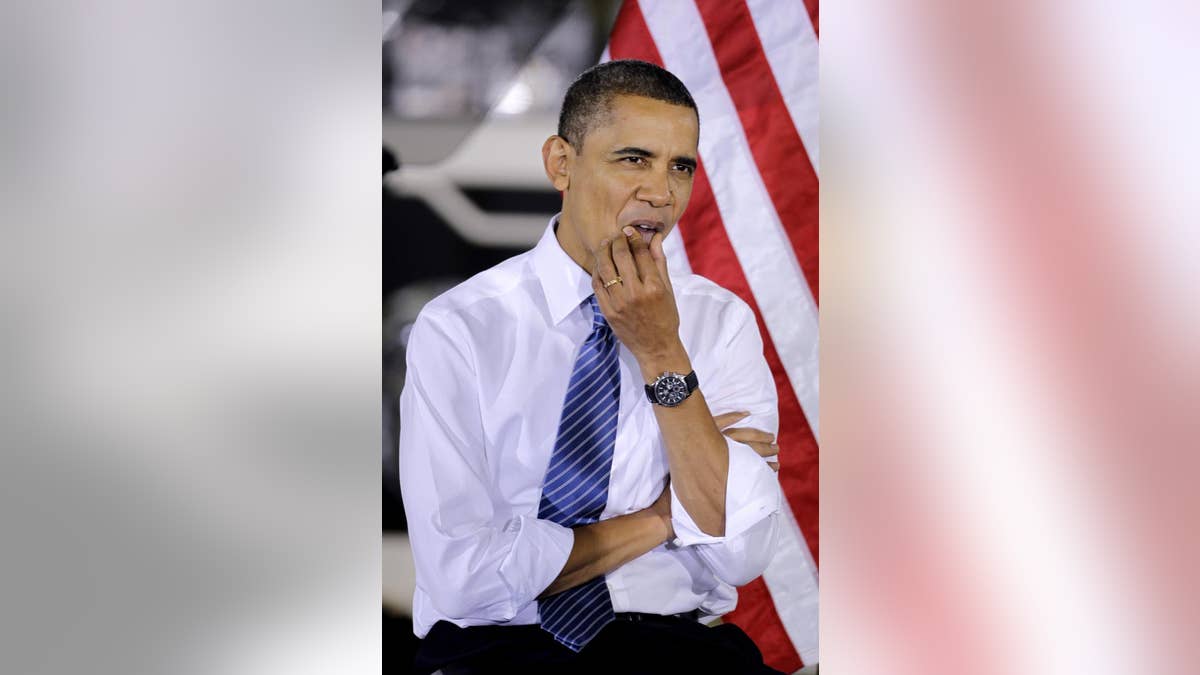
President Barack Obama listens as Vice President Joe Biden speaks at the Chrysler Indiana Transmission Plant II in Kokomo, Ind., Tuesday, Nov. 23, 2010. (AP Photo/Darron Cummings)
It starts as a whisper, a preposterous, even laughable notion, an unspeakable heresy that no sane individual, especially in Washington, where the knives are always out, would ever dare utter aloud...Then the poll numbers drop, deals get cut and compromises made, the base starts kvetching, an opposing party gains 60 or so seats in the House, and - wham-o! - the farfetched suddenly becomes...disturbingly plausible...
That's the trajectory President Obama has followed over the course of the 2010 election cycle, as the notion of him facing a primary challenge in 2012 has slowly but steadily gained steam. No established political pundit yet judges the scenario as "likely," mind you, but the unspeakable heresy is now officially Being Voiced, and in venues the White House does not take lightly.
"A damaging primary challenge from the left is not unthinkable," the Christian Science Monitor declared on Monday. And the New York Times reported on November 12, after the unveiling of a debt-reduction plan by two presidentially appointed commissioners: "So riled are some liberals about the Bowles-Simpson plan that, privately, several suggested that if Mr. Obama were to embrace its major parts, he would invite a primary challenge in 2012."
"I still think it's highly unlikely at this point," said Joe Trippi, the Democratic strategist and Fox News contributor. Trippi said he doubts his onetime client, former Vermont Governor Howard Dean - who lobbied against President Obama's health care law as too timid - would mount such a challenge. "It doesn't mean there won't be an unorthodox challenge. I think even for a Democrat to do it, it might make more sense as an independent."
Dean, who ran unsuccessfully for the Democratic nomination in 2004 and went on to serve as chair of the Democratic National Committee, told a Vermont news station shortly after Election Day that the notion of him running in 2012 was "a Washington fabrication." Asked point-blank by WCAX if he was planning a primary challenge, Dean replied: "No, and I plan to support Barack Obama in 2012."
Likewise, Secretary of State Hillary Clinton has ruled out such a bid. "I have said it over and over again, and I'm happy to say it on your show as well," Clinton told Chris Wallace on "Fox News Sunday" last weekend. "So you're done with elective office?" Wallace pressed. "I am," Clinton replied.
Another party centrist, retiring Sen. Evan Bayh of Indiana, told Fox News he, too, is out of the running as a potential primary candidate. "If there is a challenge, it will probably come from the left wing of the Democratic Party, but I think [the president] is strong enough within the party that he will be able to defeat any challenge," Bayh said. "Any chance you could be that person?" a Fox News producer asked the senator. "Uh, no," Bayh said.
Yet that hardly clears the field of potential challengers - nor erases the sentiment within the Democratic Party that has elevated the preposterous to the level of plausible. The liberal base that White House Press Secretary Robert Gibbs derided as "the professional left" remains undeniably displeased with the president's progress on a host of issues, from the war in Afghanistan to the lack of a government-run insurance option in the new health care law, from the repeal of the Pentagon's "Don't Ask, Don't Tell" policy to the continuing operation of the detention center at Guantanamo Bay.
The most likely insurgent candidate against the president - if still not objectively likely to run - is widely considered to be Sen. Russ Feingold, who lost his bid for re-election three weeks ago. In his concession speech on Election Night, Feingold told supporters, with an air of mystery: "It's onto the next battle. It's onto 2012. And it is on to our next adventure -- forward!" A spokesman for Feingold later told Politico the lame duck senator has "no interest" in challenging President Obama. But Feingold himself has remained mum since Election Night.
The only two elected presidents of the last sixty years who failed to win re-election - Presidents Jimmy Carter and George H.W. Bush - both faced damaging primary battles. Carter's nomination battle, precipitated by Sen. Edward Kennedy of Massachusetts, was more damaging than the challenge to Bush mounted by conservative commentator Pat Buchanan. "Even if it's a protest challenge, that's a pretty big bar that you've decided to take on," said Trippi. "It's not likely to succeed and it's going to isolate you in the future. In fact, I think Ted Kennedy's about the only one who successfully challenged -- didn't win, but still came back to serve in a way that mattered to the nation."
The author of "'What the Heck Are You Up To, Mr. President?': Jimmy Carter, America's 'Malaise,' and the Speech That Should Have Changed the Country," a study of Carter's final two years in office, told Fox News that he sees some similarities between President Obama's situation today and the one that Carter faced - but not enough to start counting out the current incumbent just yet. "I see that there's clearly a wing of progressives within the Democratic Party that are upset with what is clearly Obama's own centrism. That, you could say, is shared with the picture of 1979 and 1980," said Kevin Mattson, a history professor at Ohio University. "What I don't quite yet see is the personality -- a personality that has a kind of power to it which Ted Kennedy had."




